|
|
|
Sort Order |
|
|
|
Items / Page
|
|
|
|
|
|
|
| Srl | Item |
| 1 |
ID:
167376
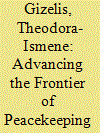

|
|
|
|
|
| Summary/Abstract |
The impact of United Nations (UN) peacekeeping on conflict has received a sustained amount of attention in the empirical literature. The advent of new data on UN peacekeeping and new temporal units of analysis have enabled researchers to expand the frontiers of peacekeeping research and undertake a more nuanced examination of peacekeeping effectiveness. In this special section, a series of articles examine how UN peacekeeping affects different types of violence within conflicts and leads to different types of peaceful outcomes. Factors such as the cultural affinity between peacekeepers and local communities, the size of peacekeeping operations and the specific composition of UN forces are shown to be important variables associated with lower levels of casualties and violence and also a higher likelihood of mediation and timely peaceful settlements in civil wars. In the aggregate, these articles suggest that robust peacekeeping is associated with better outcomes in many stages of conflict.
|
|
|
|
|
|
|
|
|
|
|
|
|
|
|
|
| 2 |
ID:
131096
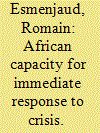

|
|
|
|
|
| Publication |
2014.
|
| Summary/Abstract |
The creation of an African Capacity for Immediate Response to Crisis (ACIRC) is a sign of Africa's willingness to take its destiny into its own hands. Presented as a reaction to the slowness of the development of the African Standby Force (ASF), it is also a response to some of the ASF's conceptual weaknesses. This decision reflects a wish to establish an instrument better equipped to deal with the challenges Africa is facing. Departing from the (sub)regional logic of the ASF results from a desire to take into account the transnational nature of threats, while its enlarged mandate is meant to offer Africa the capacity to intervene in all kinds of conflicts, including by undertaking peace enforcement activities. But the obstacles on the road towards the actual creation and mobilisation of this capacity should not be underestimated. These include material difficulties, but also political tensions, between 'small' and 'big' states as well as between the African Union and subregional organisations. The risk then is high that the ACIRC, whose announcement came as a reaction to France's intervention in Mali, ends up joining the ranks of the many 'anti-imperialist' phantoms haunting the history of the Organization of African Unity/African Union (OAU/AU). Confronted by events considered 'neocolonial' initiatives, African actors have indeed traditionally reacted by launching grand projects that never got off the ground. However, by actually establishing this new instrument, they may also demonstrate that times have definitively changed.
|
|
|
|
|
|
|
|
|
|
|
|
|
|
|
|
| 3 |
ID:
137191
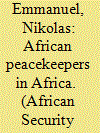

|
|
|
|
|
| Summary/Abstract |
African states today are strongly encouraged by the United States (US) and other members of the international community to play a more central role in confronting crises on the continent. Indeed, in recent years African armed forces have increasingly served as the backbone supporting various peacekeeping operations in the region. It is important to add that the international community has frequently tried to facilitate the deployment of African armed forces with aid and training. From this reality, the following study goes beyond the current literature by focusing on the international factors behind African participation in United Nations (UN) peacekeeping operations in Africa. In doing so, this research focuses on US military aid and foreign troop training from 2002 to 2012, and its impact on African deployments into UN peacekeeping missions in Africa. As can be expected, such third-party help appears to be an important motivating factor encouraging African troop deployment into crises on the continent.
|
|
|
|
|
|
|
|
|
|
|
|
|
|
|
|
| 4 |
ID:
131222
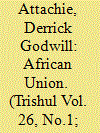

|
|
|
| 5 |
ID:
074289
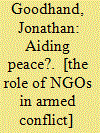

|
|
|
|
|
| Publication |
Warwickshire, ITDG Publishing, 2006.
|
| Description |
xii, 239p.
|
| Standard Number |
185339632X
|
|
|
|
|
|
|
|
|
|
|
|
Copies: C:1/I:0,R:0,Q:0
Circulation
| Accession# | Call# | Current Location | Status | Policy | Location |
| 051883 | 327.127/GOO 051883 | Main | On Shelf | General | |
|
|
|
|
| 6 |
ID:
065751
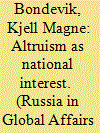

|
|
|
| 7 |
ID:
005056
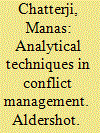

|
|
|
|
|
| Publication |
Aldershot, Dartmouth Pub., 1992.
|
| Description |
vii, 390p.; figures and tables
|
| Standard Number |
1855212218
|
|
|
|
|
|
|
|
|
|
|
|
Copies: C:1/I:0,R:0,Q:0
Circulation
| Accession# | Call# | Current Location | Status | Policy | Location |
| 036227 | 303.69/CHA 036227 | Main | On Shelf | General | |
|
|
|
|
| 8 |
ID:
126726
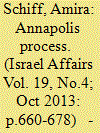

|
|
|
|
|
| Publication |
2013.
|
| Summary/Abstract |
The analysis indicates three sets of factors through which parties' willingness to achieve a consensual solution can be assessed: the contextual factors that contribute to adversaries' decision to proceed to official negotiations, the functions of the pre-negotiations and the changes that occur in the parties' perceptions during the pre-negotiations. A simultaneous exploration of these factors provides a more complete assessment of the parties' intentions and their willingness to proceed to negotiations directed at a win-win solution. This, in turn, enables a better understanding of the factors that undermine de-escalation initiatives, not only between Israel and the Palestinians but in other intractable conflicts as well.
|
|
|
|
|
|
|
|
|
|
|
|
|
|
|
|
| 9 |
ID:
016908
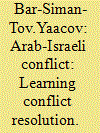

|
|
|
|
|
| Publication |
Feb 1994.
|
| Description |
75-92
|
|
|
|
|
|
|
|
|
|
|
|
|
|
|
|
| 10 |
ID:
100947
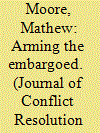

|
|
|
|
|
| Publication |
2010.
|
| Summary/Abstract |
Nearly every international arms embargo has been systemically violated by arms exporting states. Although much work has been done exploring why states transfer arms, little has been done to answer the question of why states choose to violate arms embargoes. Earlier studies have found that states transfer arms to one another for a variety of economic and strategic reasons. This study constructs a time series cross-section data set to test whether the same interests that drive dyadic arms transfers also influence the likelihood and size of arms embargo violations. Using a two-stage model of dyadic arms transfers, this study finds that measures for arms import dependence and alliance portfolio similarity best predict the likelihood and size of arms embargo violations. These results provide evidence that state decisions to violate embargoes are driven by political interests more than economic interests.
|
|
|
|
|
|
|
|
|
|
|
|
|
|
|
|
| 11 |
ID:
005019
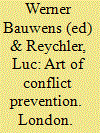

|
|
|
|
|
| Publication |
London, Brassey's, 1994.
|
| Description |
xv, 218p.
|
| Series |
Brassey's Atlantic Commentaries;7
|
| Standard Number |
85753-105-1
|
|
|
|
|
|
|
|
|
|
|
|
Copies: C:1/I:0,R:0,Q:0
Circulation
| Accession# | Call# | Current Location | Status | Policy | Location |
| 036088 | 303.69/BAU 036088 | Main | On Shelf | General | |
|
|
|
|
| 12 |
ID:
006794
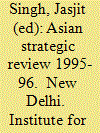

|
|
|
|
|
| Publication |
New Delhi, Institute for Defence Studies and Analysis, 1996.
|
| Description |
288p.
|
| Standard Number |
8186019049
|
|
|
|
|
|
|
|
|
|
|
|
Copies: C:1/I:0,R:0,Q:0
Circulation
| Accession# | Call# | Current Location | Status | Policy | Location |
| 038598 | 355.005095/SIN 038598 | Main | On Shelf | General | |
|
|
|
|
| 13 |
ID:
074557
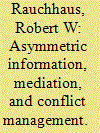

|
|
|
|
|
| Publication |
2006.
|
| Summary/Abstract |
This article examines mediation in conflicts using both a game-theoretic model and a quantitative analysis. The game-theoretic model suggests that mediator effectiveness rests primarily on the ability of third parties to provide critical information about the disputants' reservation points. The empirical analysis finds that mediation that targets asymmetric information is a highly effective form of conflict management. Moreover, the results suggest that mediation outperforms other forms of third-party intervention, including those that entail coercion. Both the model and quantitative analysis indicate that impartial mediators will generally outperform biased ones. Along with providing new information on conflict management, the quantitative analysis also has broader implications for IR theory. The results provide empirical support for the rationalist claim that asymmetric information is one of the root causes of war.
|
|
|
|
|
|
|
|
|
|
|
|
|
|
|
|
| 14 |
ID:
075921
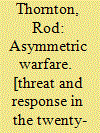

|
|
|
|
|
| Publication |
Malden, Polity Press, 2007.
|
| Description |
viii, 241p.
|
| Standard Number |
074563365X
|
|
|
|
|
|
|
|
|
|
|
|
Copies: C:1/I:0,R:0,Q:0
Circulation
| Accession# | Call# | Current Location | Status | Policy | Location |
| 052180 | 327.17/THO 052180 | Main | On Shelf | General | |
|
|
|
|
| 15 |
ID:
156974
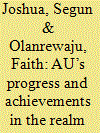

|
|
|
|
|
| Summary/Abstract |
When Organisation of African Unity (OAU) was formed, the problem confronting Africa continent then was colonialism. It is therefore not a surprise that its major preoccupation was how to liberate countries within the continent that were still under the grip of colonialism. However, the surge of conflicts in various African countries shortly after independence, manifesting in form of ethnicity, religious, struggle for political power among others, coupled with OAU policy of non-intervention in the domestic affairs of member states, combined to turn African continent to the bedlam of the world. The failure of OAU led to the formation of the African Unity (AU) to correct some of these ills. This article examines AU’s achievements in the realm of peace and security using secondary sources of data gathering. Since AU came on board, how far has it fared in promoting peace and security in the continent? Findings reveal that although AU has achieved much in the realm of peace and security in Africa, yet it lacks the needed human resources and institutional capacity to conduct effective peace operations and peace-making initiatives. The study therefore suggested among others the need to strengthen AU’s institutional capacity and more personnel should be donated by members countries
|
|
|
|
|
|
|
|
|
|
|
|
|
|
|
|
| 16 |
ID:
068297
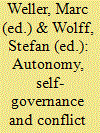

|
|
|
|
|
| Publication |
London, Routledge, 2005.
|
| Description |
xi, 276p.
|
| Standard Number |
0415339863
|
|
|
|
|
|
|
|
|
|
|
|
Copies: C:1/I:0,R:0,Q:0
Circulation
| Accession# | Call# | Current Location | Status | Policy | Location |
| 051005 | 320.15/WEL 051005 | Main | On Shelf | General | |
|
|
|
|
| 17 |
ID:
124143
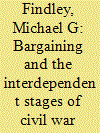

|
|
|
|
|
| Publication |
2013.
|
| Summary/Abstract |
This article examines civil war resolution as a process comprised of multiple interdependent stages. It engages directly the idea that peace emerges only as a process comprised of battle, negotiation, agreement, and implementation of an agreement. I hypothesize that events at earlier stages of the peace process have implications for later stages, but not always in the same ways. Drawing on bargaining models of war, I consider how two factors that might prevent successful bargaining-stalemates and the number of actors-can encourage cooperation early in a peace process but impede lasting cooperation at later stages. Using a nested dichotomies statistical approach to capture interdependence, I find support for the argument that stalemates and the number of actors have different effects depending on the stage of the peace process. The results substantiate the need in theoretical and policy work to consider peace as an interdependent, sequential process.
|
|
|
|
|
|
|
|
|
|
|
|
|
|
|
|
| 18 |
ID:
176501
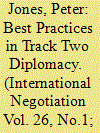

|
|
|
|
|
| Summary/Abstract |
While “Track Two Diplomacy” has been intensively researched since its founding some 60 years ago, much remains to be done to explore important gaps in our understanding of these dialogues. Track Two presents unusual research problems, given its operational and often confidential nature. The contributions to this special issue of International Negotiation tackle some of the key issues confronting the field in an effort to present where we stand in terms of best practices and where further thought and research is required.
|
|
|
|
|
|
|
|
|
|
|
|
|
|
|
|
| 19 |
ID:
110027
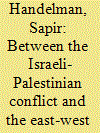

|
|
|
|
|
| Publication |
2012.
|
| Summary/Abstract |
How to create a peacemaking change in the Israeli-Palestinian struggle? The consensus solution to the Israeli-Palestinian conflict is a 'two-state solution', which means separation between two major identity groups. This paper points to the necessity to shift the emphasis in the peacemaking discussion. Instead of manufacturing solutions in a peacemaking laboratory, it would be better to focus on finding the social conditions that have the potential to create an effective peacemaking process. This paper suggests establishing a major Israeli-Palestinian public negotiating congress that has the potential to create a peacemaking revolution. The vision is based on the multi-party talks that had been conducted in Apartheid South Africa and Northern Ireland during the 'troubles' and the Minds of Peace Experiment - a small-scale Israeli-Palestinian public negotiating congress - that has been conducted in various locations around the world.
|
|
|
|
|
|
|
|
|
|
|
|
|
|
|
|
| 20 |
ID:
176538
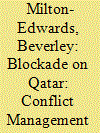

|
|
|
|
|
| Summary/Abstract |
Current tensions in the Gulf region highlight the persistence of crises and conflict. A number of states within the area now regularly engage in interventionist actions that challenge previously held norms of sovereignty and non-intervention. Fragmentation characterises what were once considered fairly robust structures of unity and enduring regional organisation. Theoretical norms that presuppose non-intervention are tested by new forms of coercion and interventionism among Gulf actors that exacerbate rather than resolve security dilemmas. In turn, this highlights the inadequacies of normative models of conflict management and resolution, and in particular mediation. These developments are examined in the case of the blockade against Qatar instituted by Bahrain, Egypt, Saudi Arabia and the United Arab Emirates in June 2017.
|
|
|
|
|
|
|
|
|
|
|
|
|
|
|
|
|
|
|
|
|